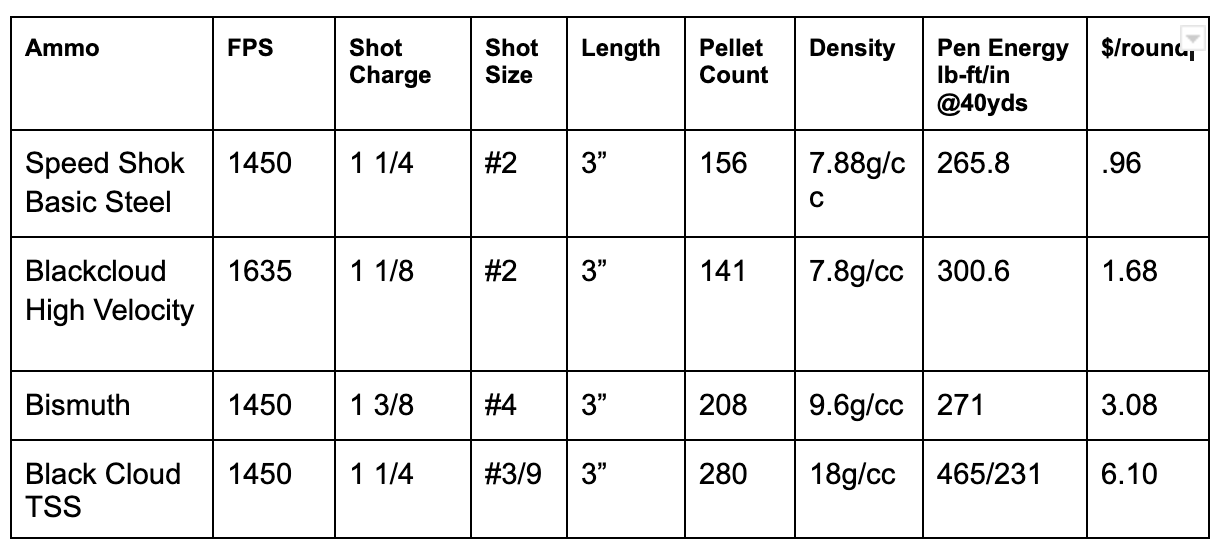Best Ammo for Duck 🦆 Hunting?
Sep 29, 2022
What is The Best Ammo For Waterfowl Hunting? There are so many options these days it can be a challenge to make the right decision. You could just buy the cheapest ammo on the shelf, but is that going to be the best option for a successful hunt?
As with so many things, what is best is a little subjective, and it is full of situational context and of course, tradeoffs. Larger shot size, faster velocities, and higher density metals, they all have tradeoffs. With more questions than educated answers, we went to the range to test a variety of different duck hunting loads to learn what the best ammo for duck hunting is.
To minimize variables, we shot the same gun (Browning A5) and the same choke (Carlson's Delta Series) throughout our testing. With so many brands of ammo and different options, we narrowed it down to Federals line of Waterfowl of ammo for simplicity's sake and so that we could make a video that people would actually want to watch.
AMMO TESTED
Our "cheapish" basic steel option was the Federal Speed Shok
Our premium steel option was the Federal Black Cloud High Velocity
Bismuth has become a popular option over the last several years, so we included Federal Bismuth
At the high end of the price spectrum is TSS (Tungsten Super Shot) We used the Federal Black Cloud TSS
Below is a table of how the different ammunitions stack up.

For this test, we wanted to look at a few different factors. The first factor was pattern performance. For this we set up a pattern board with a 30" circle with a duck in the middle of the circle. We wanted to see how many pellets would land in the 30" circle but also in the duck. Looking at patterns we considered the point of impact, pattern distribution consistency, and percentage of pellets that landed within the circle, and the number of pellets in the duck. We shot patterns at both 30 and 40 yards.
To look at ballistic energy we set up a duck-sized bock of ballistic gell to observe the difference in downrange energy and penetration.

If all we were looking at were the performance of the rounds, the TSS wins hands down. But, TSS has a tradeoff, and that is price. At around $6 bucks a shot, this ammo may not be an option that some duck hunters can stomach or afford. Price aside, the performance of the Federal TSS rounds was impressive. If I wanted to down a duck and price wasn't an issue, this would be my choice hands down.
One of the biggest surprises from this test is how well the Federal Speed Shok performed. The Speed Shok had the lowest drop-off of pattern performance from 30 yds to 40 yds. For the price, the Speed Shok was outstanding. The downside of this round compared to the rest is that it carries the lowest amount of energy at 40 yards and if we push beyond that we would start to see it drop off quickly.
The Bismuth didn't perform as well as the basic steel when it came to the percent of pellets in the 30" circle at 40 yards, but it did very well at 30 yards. At 30 yards, the Bismuth put more pellets in the duck and circle but it also has 208 pellets vs the 156 of the Speed Shok. That is one of the Benefits of going to a more dense metal, you can make the shot smaller, and in turn, you end up with more pellets. To be fair to the Bismuth, it is advised to shoot a Bismuth choke for better performance. We did shoot one round at 40 yards with a Bismuth choke out of curiosity and our patterned improved 8%.
While the Black Cloud high-velocity ammo seemed to be the most inconsistent on the patterns it did well and had pretty great penetration at 40 yards with some pellets penetrating 5 3/8 inches.
So how do we draw a conclusion from this info? I wish there were an easy, clear-cut answer but I really think it depends on your situation and budget. Here are a few of your tradeoff considerations.
Shot Size - The bigger you go with shot size, the more energy you will carry down range, but the tradeoff is that you will lose pellet count, inevitably placing less pellets on your intended target and creating more gaps in your pattern down range. So why not go with the smallest shot size possible? The smaller your shot size, the less energy you will have downrange, limiting you to closer-range shots.
Velocity - Is faster always better? Faster means that all else equal, you will carry energy further down range, but you will also generally have a lower pellet count. Added velocity can help lower your lead amounts on your ducks, but it will also increase recoil.
Metal Density - The denser the metal used like Bismuth or TSS, you can use a smaller shot size and have a lot more pellets while maintaining energy further down range. The biggest tradeoff with denser metals is the price.
These are some of the considerations you should consider before you grab whatever is on the shelf. I think all of these different rounds have a place, but for me, it depends on my hunting situation. If I am in a blind with a bunch of hunters and we are going to all be shooting and shooting a lot, I may just go with the Speed Shok. If I am solo hunting or hunting with a small group and we may have limited opportunities, I looking to go with the Black Cloud TSS.
In Summary, I don't think there is a true right or wrong answer to the question, what is the best duck hunting ammo, but I do believe that knowledge is power and power means more downed ducks for your situation.
Whether our targets in the field or our targets in life, we will only hit what we are focused on so live the #targetfocusedlife
Stay Target Focused,
Steve









